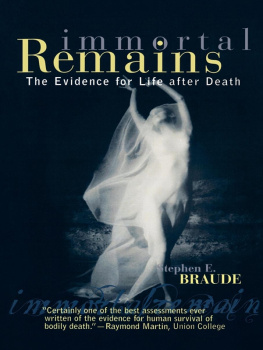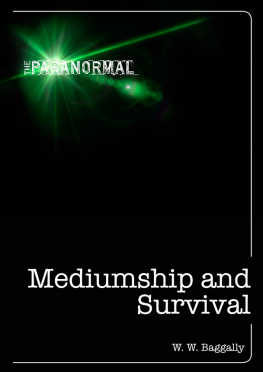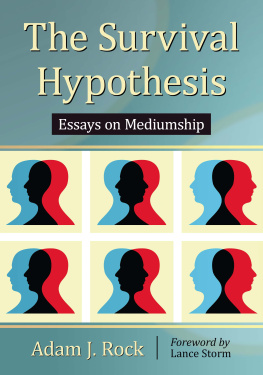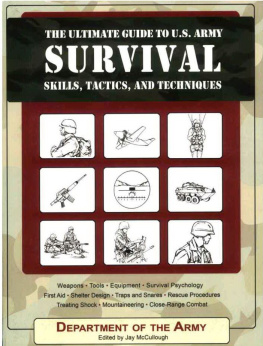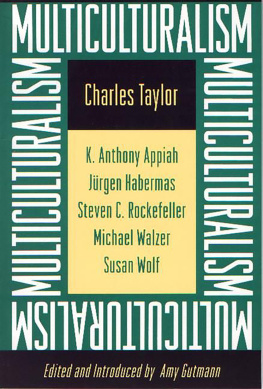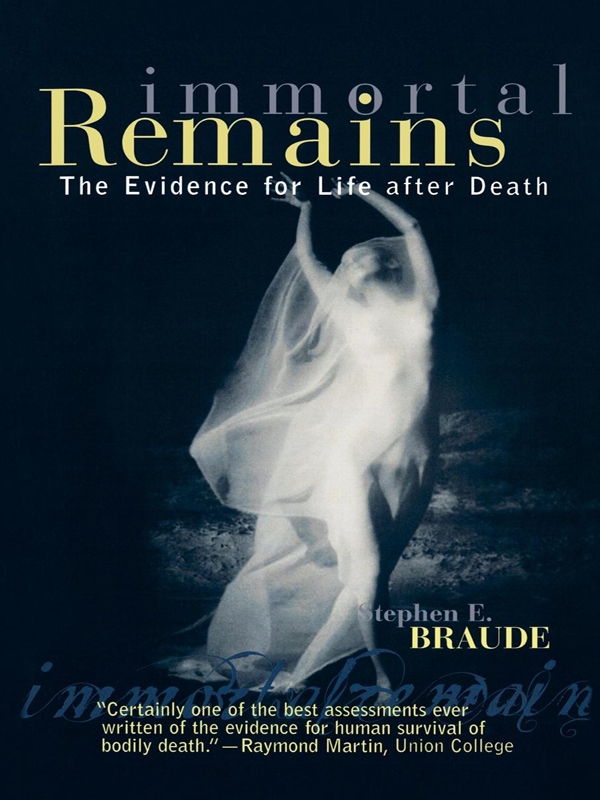Stephen E. Braude is professor of philosophy and chairman of the philosophy department at the University of Maryland Baltimore County. He studied philosophy and English at Oberlin College and the University of London, and in 1971 he received his Ph.D. in philosophy from the University of Massachusetts at Amherst.
After publishing a number of articles in the philosophy of language, temporal logic, and the philosophy of time, he turned his attention to several related problems in the philosophy of science and the philosophy of mindin particular, questions concerning causality, scientific explanation generally, and psychological explanation specifically. One of his overriding concerns was to demonstrate the inadequacy of mechanistic theories in psychology and cognitive science. He also examined the evidence of parapsychology to see whether it would provide new insights into these and other traditional philosophical issues. After that, he shifted his focus to problems in philosophical psychopathology, writing extensively on the connections between dissociation and classic philosophical problems as well as central issues in parapsychologyfor example, the unity of consciousness, multiple personality and moral responsibility, and the nature of mental mediumship.
Prof. Braude is past president of the Parapsychological Association and the recipient of several grants and fellowships, including research fellowships from the National Endowment for the Humanities and the BIAL Foundation in Portugal. He has published more than fifty philosophical essays in such journals as Nos; The Philosophical Review; Philosophical Studies; Analysis; Inquiry; Philosophia; Philosophy, Psychiatry and Psychology; The Journal of Scientific Exploration; and The Journal of Trauma and Dissociation. His three previous books are ESP and Psychokinesis: A Philosophical Examination; The Limits of Influence: Psychokinesis and the Philosophy of Science; and First Person Plural: Multiple Personality and the Philosophy of Mind. He is also a professional pianist and composer and a prize-winning stereo photographer.
Bibliography
Ackermann, R. (1961). Inductive Simplicity. Philosophy of Science 28: 152160.
Akolkar, V. V. (1992). Search for Sharada: Report of a Case and Its Investigation. Journal of the American Society for Psychical Research 86: 209247.
Allison, L. W. (1934). Proxy Sittings with Mrs. Leonard. Proceedings of the Society for Psychical Research 42: 104146.
. (1941). Further Proxy Sittings with Mrs. Leonard. Journal of the American Society for Psychical Research 35: 196225.
Almeder, R. (1992). Death and Personal Survival. Lanham, MD: Rowman & Littlefield.
. (1996a). Almeders Reply to Wheatley and Braude. Journal of Scientific Exploration 10: 529533.
. (1996b). Recent Responses to Survival Research. Journal of Scientific Exploration 10: 495517.
. (2001). On Reincarnation: A Reply to Hales. Philosophia 28: 347358.
Alvarado, C. S. (1997). Mapping the Characteristics of Out-of-Body Experiences. Journal of the American Society for Psychical Research 91: 1532.
. (2000). Out-of-Body Experiences. In E. Cardea, S. J. Lynn, and S. Krippner (eds.), Varieties of Anomalous Experiences. Washington, DC: American Psychological Association: 183218.
Anderson, R. I. (1992). Commentary on the Akolkar and Stevenson Reports. Journal of the American Society for Psychical Research 86: 249256.
Astrain, A. (1912-1925). Historia de la Compaia de Jess en la Asistencia de Espaia (4 vols .). Madrid: Razon y Fe.
Aune, B. (1985). Metaphysics: The Elements . Minneapolis: University of Minnesota Press.
Ayer, A. J. (1973). The Central Questions of Philosophy. London: Weidenfeld and Nicolson.
Barker, S. F. (1961). On Simplicity in Empirical Hypotheses. Philosophy of Science 28: 162171.
Barrett, W. F. (1917). On the Threshold of the Unseen . London: Kegan Paul, Trench, Trubner & Co.
. (1918). Note on Telepathy and Telergy. Proceedings of the Society for Psychical Research 30: 251260.
Basmajian, J. (1963). Control and Training of Individual Motor Units. Science 141: 440441.
. (1972). Electromyography Comes of Age. Science 176: 603609.
Baumgarten, F. (1930). Wunderkinder psychologische Untersuchungen. Leipzig: Johann Ambrosius Barth.
Beach, F. A., et al. (eds.). (1960). The Neuropsychology of Lashley: Selected Papers of K. S. Lashley . New York: McGraw-Hill.
Berger, D., et al. (1994). Dissociative Symptoms in Japan. American Journal of Psychiatry 151: 148149.
Berger, R. E., and Persinger, M. A. (1991). Geophysical Variables and Behavior: LXVII. Quieter Annual Geomagnetic Activity and Larger Effect Size for Experimental Psi (ESP) Studies over Six Decades. Perceptual & Motor Skills 73: 12191223.
Besterman, T. (1931-32). Further Inquiries into the Element of Chance in Book-tests. Proceedings of the Society for Psychical Research 40: 5998.
. (1933). An Experiment in Clairvoyance with M. Stefan Ossowiecki. Proceedings of the Society for Psychical Research 41: 345352.
Bialystok, E., and Hakuta, K. (1994). In Other Words: The Science and Psychology of Second-Language Acquisition . New York: Basic Books.
Bishai, D. (2000). Can Population Growth Rule Out Reincarnation? A Model of Circular Migration. Journal of Scientific Exploration 14: 411420.
Braude, S. E. (1979). ESP and Psychokinesis: A Philosophical Examination . Philadelphia: Temple University Press.
. (1980). Selected Poems of Patience Worth. In J. Laughlin (ed.), New Directions in Prose and Poetry 40. New York: New Directions Press: 155-166.
. (1987). Psi and Our Picture of the World. Inquiry 30: 277-294.
. (1992a). Reply to Stevenson. Journal of Scientific Exploration 6: 151156. Reply to Stevenson, 1992.
. (1992b). Review of S. Pasricha, Claims of Reincarnation: An Empirical Study of Cases in India. Journal of Parapsychology 56: 380384.
. (1993). Dissociation and Survival: A Reappraisal of the Evidence. In L. Coly and J. D. S. McMahon (eds.), Parapsychology and Thanatology. New York: Parapsychology Foundation, Inc.: 208237.
. (1995). First Person Plural: Multiple Personality and the Philosophy of Mind . (Rev. ed.) Lanham, MD : Rowman & Littlefield.
. (1996). Postmortem Survival: The State of the Debate. In M. Stoeber and H. Meynell (eds.), Critical Reflections on the Paranormal . Albany: State University of New York Press: 177196.
. (1997). The Limits of Influence: Psychokinesis and the Philosophy of Science . (Rev. ed.) Lanham, MD: University Press of America.
. (2000). Dissociation and Latent Abilities: The Strange Case of Patience Worth. Journal of Trauma and Dissociation 1 (2): 1348.
. (2001a). Out-of-Body Experiences and Survival of Death. International Journal of Parapsychology 12: 83129.
. (2001b). The Problem of Super Psi. In F. Steinkamp (ed.), Parapsychology, Philosophy, and the Mind: A Festschrift in Honor of John Beloffs 80th Birthday . Jefferson, NC: McFarland.
. (2002). ESP and Psychokinesis: A Philosophical Examination (rev. ed.). Parkland, FL: Brown Walker Press.
Broad, C. D. (1953). Religion, Philosophy and Psychical Research . London: Routledge & Kegan Paul.
. (1958/1976). Personal Identity and Survival. In J. M. O. Wheatley and H. L. Edge (eds.), Philosophical Dimensions of Parapsychology. Springfield, IL: Charles C. Thomas: 348365.
. (1962). Lectures on Psychical Research. London: Routledge & Kegan Paul.
Broughton, R. S. (1991). Parapsychology: The Controversial Science . New York: Ballantine Books.

